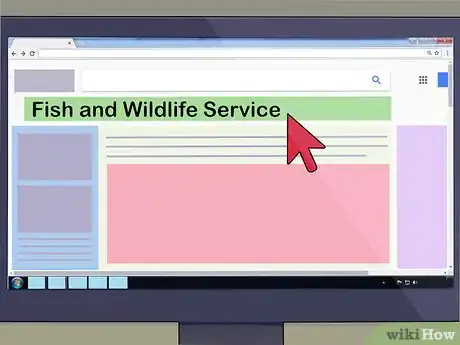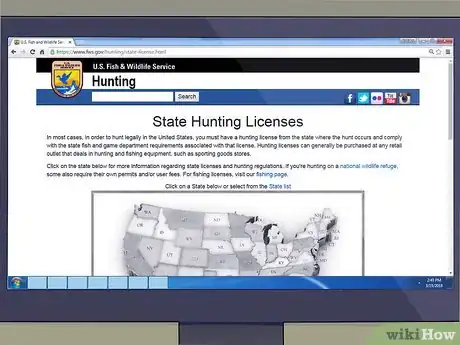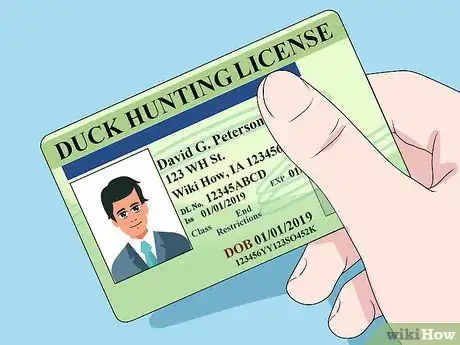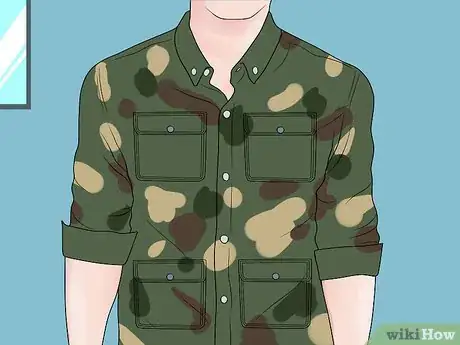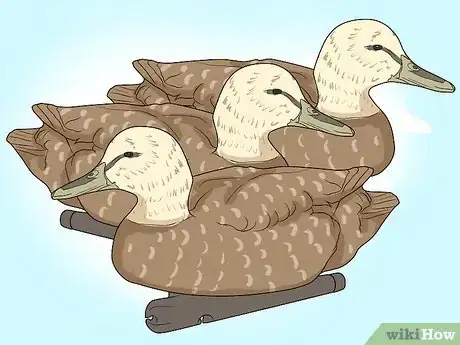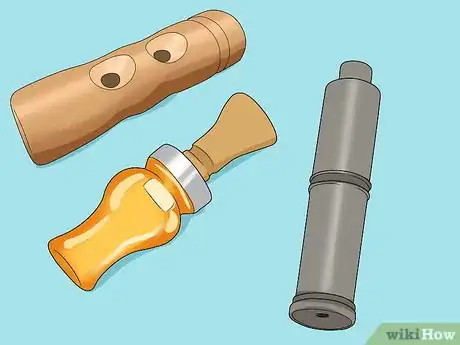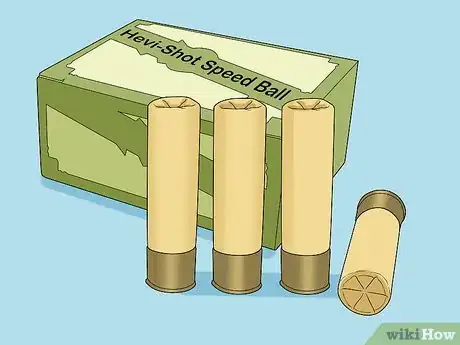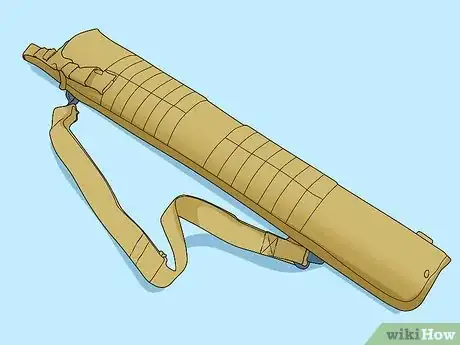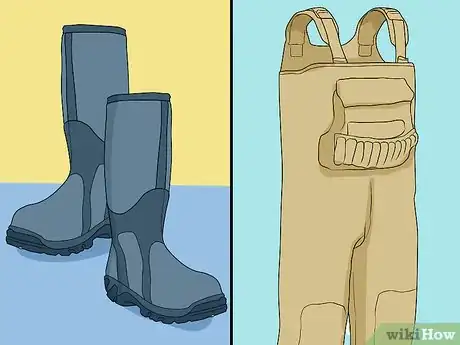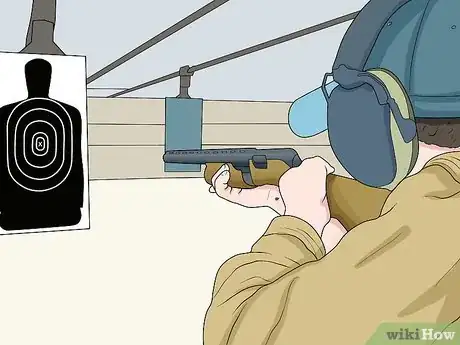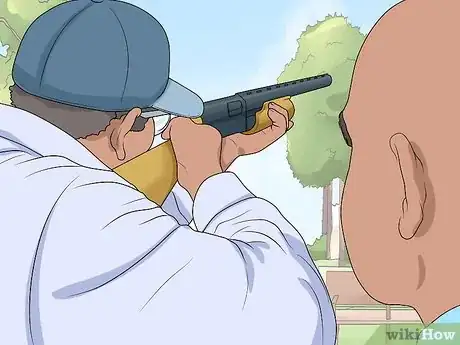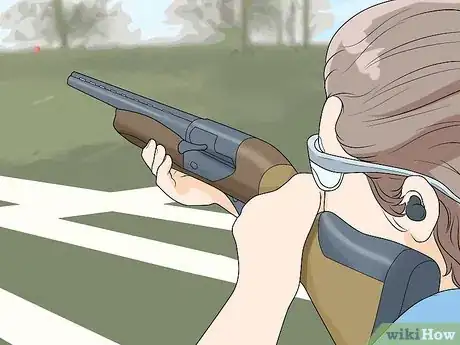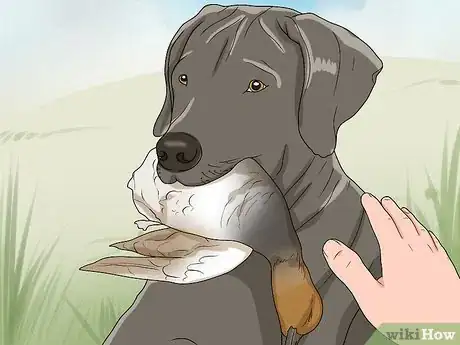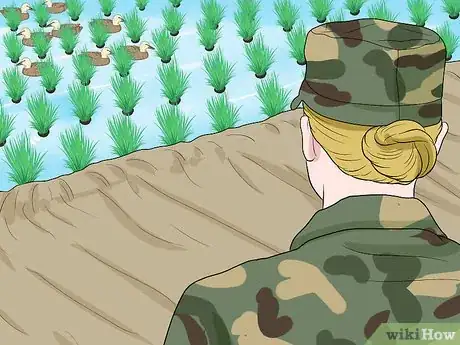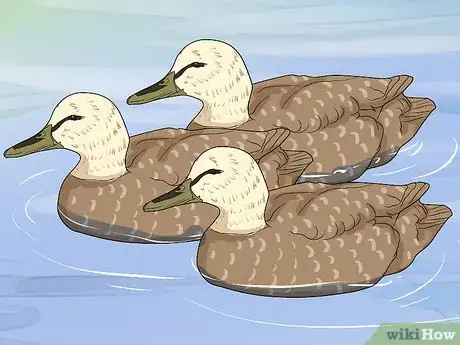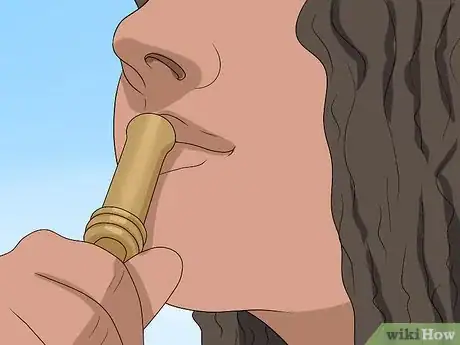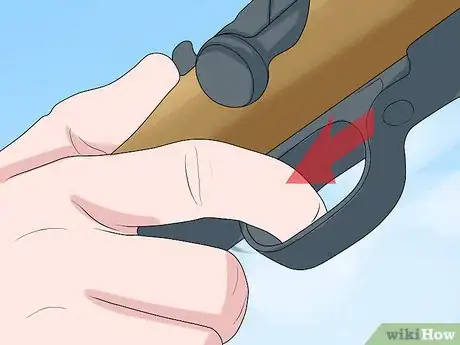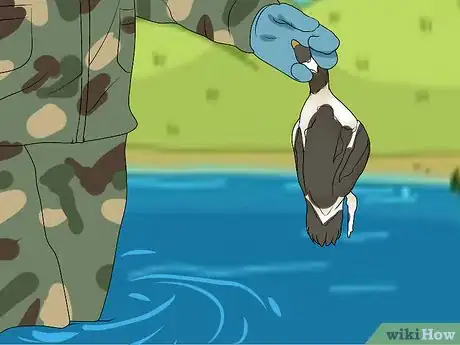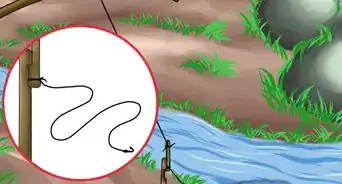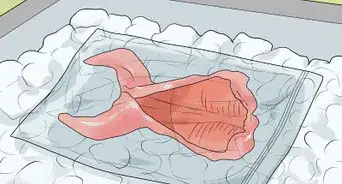This article was co-authored by wikiHow Staff. Our trained team of editors and researchers validate articles for accuracy and comprehensiveness. wikiHow's Content Management Team carefully monitors the work from our editorial staff to ensure that each article is backed by trusted research and meets our high quality standards.
There are 22 references cited in this article, which can be found at the bottom of the page.
This article has been viewed 88,260 times.
Learn more...
Duck hunting is a challenging but rewarding outdoor sport that just about anyone can learn. Before you start your hunt, it's important that you get the proper licenses, permissions, and equipment. In addition, you should have experience shooting a shotgun and understand all the safety precautions regarding firearms. Once you're prepared and have the experience and knowledge you need, you can go out and start hunting ducks.
Steps
Getting Your Hunting License
-
1Visit your local Fish and Wildlife's website to learn hunting rules. Your local Fish and Wildlife Service's website will have the laws and rules for duck hunting near you. Hunting certain species of ducks or hunting ducks off-season could be illegal. Research the dates for hunting season and plan your hunts within those dates. Make sure you read and understand all the legal rules and restrictions before you start hunting.[1]
- Duck hunting season typically occurs in the fall and winter.[2]
- Your Fish and Wildlife’s website will list the species of ducks that you’re allowed to hunt.
-
2Apply for a hunting license in the state you want to hunt in. You must get a duck hunting license in the state that you plan on hunting in. Licences typically last one year and are more expensive if you’re not a resident of the state that you’re hunting in. To get a license, visit your local Fish and Wildlife Service’s website and apply online. To get a list of the different state offices, visit https://www.fws.gov/hunting/state-license.html.[3]
- You’ll typically receive your license in the mail in a few weeks, or you can print out a temporary e-license in many states.
- Hunting licenses will typically cost $50 - $200 depending on where you live.[4]
Advertisement -
3Purchase a Federal Duck Stamp if you live in the U.S. If you’re over 16 years of age and plan on hunting ducks in the United States, it’s mandatory that you purchase a Federal Duck Stamp. You can buy one at hunting stores, sporting goods stores, or online by visiting https://www.fws.gov/birds/get-involved/duck-stamp/e-stamp.php.[5]
- Stick your stamp onto your hunting license.
- A Federal Duck Stamp also gives you free entry into national wildlife refuges.
- Purchasing a Federal Duck Stamp supports bird habitat conservation.
-
4Use your license to hunt in designated public areas or wildlife refuges. If you have your duck hunting license and your Federal Duck Stamp, you can hunt legally on designated public lands or certain wildlife refuges. If you want to hunt on privately owned land, you’ll have to get permission from the landowner. Your local hunting commission will usually have the contact information for popular private hunting locations. Visit or call the owner and politely ask them if you can hunt on their land.[6]
- If you want to hunt on private land but the owner says no, you'll have to find another hunting spot.
Buying the Proper Gear
-
1Wear camouflage that blends in with your surroundings. You can purchase a variety of different camouflage online, at hunting stores, or in most sporting goods stores. Purchase a camo shirt, pants, gloves, hat, and jacket. This will help you blend in with your surroundings and can prevent you from scaring away ducks.[7]
- If you are hunting in an area with wheat stalks or dead grass, a lighter camo is perfect.
- If you are hunting in an area with a lot of foliage, plants, and bushes, a greener camo is ideal.
- Dark black or brown camo is best in wooded areas.
-
2Purchase duck decoys. Decoys are hollow plastic models that float in the water and resemble ducks. If you know what species of duck you’re hunting, get a decoy that’s the same species to attract them to your hunting site.[8]
- If you’re unsure of what kind of ducks you’re hunting, mallard decoys will typically attract most species of ducks.[9]
-
3Buy a duck call for the species you plan to hunt. You can purchase a duck call at a hunting or sporting goods store. Using certain calls will attract ducks to your location, making it easier for them to shoot.[10]
- Duck call whistles are typically the easiest for first-time hunters to use because you can just blow in them and don’t have to make a specific noise when using them.
-
4Buy a 12-gauge shotgun. 12-gauge shotguns are the standard for duck hunting. You’ll have to decide whether you want to purchase a semi-automatic or a pump-action model. Popular duck hunting guns include the Remington 870, Winchester Model 12, and Browning BPS.[11]
- Pump action shotguns require you to cock back the gun before every shot.
- 20-gauge shotguns are typically used by young hunters while 10-gauge shotguns are popular for goose hunting.
-
5Use a non-toxic ammunition. Lead bullets are considered toxic and cannot be used to hunt ducks. Steel, bismuth, tungsten, and other non-toxic shells should always be used when duck hunting. 3-inch (7.6 cm) shots are the most common shell size that’s used when hunting ducks.[12]
- Try out different brands of shells and determine which ones you like using the best.
- Popular brands include the Hevi-Shot Speed Ball, Remington HyperSonic Steel, and Kent TealSteel.
-
6Purchase a sleeve for your gun. A sleeve will fit around your gun and will keep it clean while you’re walking around the hunting site. Dirt and debris can get in your gun and cause it to jam, making a gun sleeve necessary if you’re hunting in mud or dirt.[13]
-
7Buy high boots and waders so you can retrieve the ducks. Waders are water repellent overalls that will keep your body dry. If you're hunting over a lake, you'll have to wade out into the water to retrieve downed ducks. Boots will prevent your shoes and socks from getting wet. This is critical if you plan on hunting in the cold weather.
- You can typically purchase waders in a similar camo as the rest of your gear.
Training Before the Hunt
-
1Learn about gun safety. Never point your gun towards a living thing or object and always assume that your shotgun is loaded, even if it isn't. Do not put your finger on the trigger unless you're ready to shoot and always act serious and responsible when holding your gun. If you'd like to learn additional gun safety rules, you can take a safety or shotgun-specific course at a local shooting range.[14]
-
2Learn how to shoot a shotgun. Take shooting classes or practice with an experienced person on a closed course before you go on your first hunt. They will teach you how to properly load, cock, and fire your shotgun, and can instruct you on proper gun safety and hunting etiquette.[15]
- Start your training on stationary targets before moving onto moving targets.
-
3Practice shooting at a clay or skeet shooting course. A clay or skeet shooting course will let you practice shooting the gun before you start hunting. These courses fire clay targets into the air to emulate ducks. Practicing at a range will make your more accurate when shooting at the real thing.[16]
-
4Train your dog to retrieve downed ducks if desired. Labrador Retrievers, English Setters, and English Springer Spaniels are the ideal dog breeds for hunting. You can buy a dog and train it yourself or you can find a breeder or trainer that has pre-trained dogs. To train your dog, you'll have to simulate hunting scenarios and get your dog acclimated to certain commands and the scent of a duck.[17]
- While having a retrieval dog isn't necessary, it will make getting the birds you down much easier.
Hunting for Your First Time
-
1Hunt with an experienced hunter your first time. Don’t go out on a hunt by yourself the first time. Experienced hunters can instruct you on the most effective methods of hunting ducks and can also advise you on safety. Also, they can help you use duck calls and other more advanced techniques if you’re unsure of what you’re doing.[18]
-
2Scout for ducks before you bring your gear. Look for ducks in large bodies of water and in agricultural fields. Mark down locations where you notice a large group of ducks. Don’t hunt directly in roosting areas, or places where ducks congregate. Doing this could cause the entire flock to relocate. Instead, work your way a couple of meters from the main roost and set up your hunting site there.[19]
-
3Set your decoys out to attract the ducks. Set your decoys out on land or in a lake to attract new ducks. If you're setting your decoys out in a body of water, make sure that you tether them together and then secure the tether to a tree so they don’t float away. The best time to set out your decoys is in the early morning.[20]
-
4Use your duck call if you have one. A duck call isn’t always necessary for a hunt, especially if you are hunting in a duck-heavy site. However, if you’re having trouble attracting ducks, you can use several duck calls. There are a variety of different calls and include the basic quack, greeting call, feed call, pleading call, and whistles.[21]
- The greeting call is 5 or 6 notes and sounds like “Kanc, Kanc, Kanc, Kanc, Kanc.”
- The pleading call is used for birds that are flying high above you and sounds like “Kaaanc, Kanc, Kanc, Kanc,” with the first note being held for a longer time.
-
5Steady your shotgun and aim slightly in front of a flying duck. Put the buttstock comfortably against your shoulder and use your other hand to support the bottom of the shotgun. Look down the sights on the gun and point the gun slightly in front of the target. Try to track the bird as it flies.[22]
- Make sure you only shoot ducks that are legal to hunt. If you can't identify the species of bird, don't shoot it.
- Learning proper distances for your lead requires practice.
-
6Squeeze the trigger to shoot the duck. Squeeze your hand to discharge a shot from your shotgun. If you put the proper lead on the duck, you will have hit it. Continue practicing until you become more accurate and efficient at hitting your target.[23]
- Don't pull the trigger or your shot will be off. Instead, squeeze your hand to pull the trigger.
-
7Retrieve any ducks that you’ve shot. If you don’t have a dog that’s trained to retrieve ducks, then you’ll have to retrieve them yourself after you’ve shot them. Make sure that everyone is done shooting, then go to the location where you downed the duck and store it in a sack until you dress it.[24]
- Always wear rubber gloves when handling ducks because they could be carrying diseases.
- If the downed duck fell into the water, wear high boots and waders to retrieve it from the water.
Community Q&A
-
QuestionDo I need a duck stamp to go duck hunting?
 Community AnswerYes, I think most states require 2 stamps, a federal and a state stamp. The federal stamp is good in every state, obviously, but you will have to buy a local stamp for the state you wish to hunt in as well.
Community AnswerYes, I think most states require 2 stamps, a federal and a state stamp. The federal stamp is good in every state, obviously, but you will have to buy a local stamp for the state you wish to hunt in as well. -
QuestionWhat do I do if a duck I shot is not completely dead?
 Community AnswerTry to break its neck by swinging it in a circle and then snapping it; you'll kill it instantly with no unnecessary suffering. If it is a runner, try to shoot it again.
Community AnswerTry to break its neck by swinging it in a circle and then snapping it; you'll kill it instantly with no unnecessary suffering. If it is a runner, try to shoot it again. -
QuestionWhat type of shotgun should I use when duck hunting?
 Community AnswerMost shotguns used are pump or of the double barrel variety. A pump shotgun will have to be modified to fit a certain number of shells if your state regulations deem it necessary. Most pump shotguns will eject off the left hand side of the barrel, so if you shoot left-handed, that hot shell will pop out into your chest, and possibly go down your shirt and burn you. If you are left-handed, you can get ambidextrous pump shotguns or a side-by-side or over-and-under gun.
Community AnswerMost shotguns used are pump or of the double barrel variety. A pump shotgun will have to be modified to fit a certain number of shells if your state regulations deem it necessary. Most pump shotguns will eject off the left hand side of the barrel, so if you shoot left-handed, that hot shell will pop out into your chest, and possibly go down your shirt and burn you. If you are left-handed, you can get ambidextrous pump shotguns or a side-by-side or over-and-under gun.
Things You'll Need
Your Hunting License
- Computer with internet access
Training Before the Hunt
- 12-gauge shotgun
- Retrieval dog (optional)
- Ammunition
Hunting for Your First Time
- Duck decoys
- Duck call
- 12-gauge shotgun
- Non-toxic ammunition
- Camouflaged clothing
- Retrieval dog (optional)
- Gun sleeve
- High boots
- Waders
References
- ↑ https://www.fws.gov/le/waterfowl-hunting-and-baiting.html
- ↑ https://www.wildlife.ca.gov/hunting/waterfowl
- ↑ https://www.wildlife.ca.gov/hunting/waterfowl#877769-licenses-etc
- ↑ https://www.wildlife.ca.gov/Licensing/Hunting
- ↑ https://www.fws.gov/birds/get-involved/duck-stamp.php
- ↑ http://www.michigan.gov/documents/dnr/DNR_HAP_lands_list_439893_7.pdf
- ↑ http://www.hunter-ed.com/blog/duck-hunting-beginners-guide/
- ↑ https://youtu.be/pRVnQvNAf3o?t=36s
- ↑ https://www.biggamelogic.com/Articles-News/articleType/ArticleView/articleId/502/Duck-Hunting-For-Beginners
- ↑ http://www.ducks.org/hunting/duck-calling/8-duck-calls-every-duck-hunter-must-master
- ↑ https://www.fieldandstream.com/15-best-duck-and-goose-guns-ever
- ↑ https://www.outdoorlife.com/blogs/gun-shots/best-duck-loads-how-pick-right-shell-right-bird
- ↑ https://youtu.be/y_Un0X9v_xY?t=34s
- ↑ http://www.dec.ny.gov/outdoor/9186.html
- ↑ https://firearmtraining.nra.org/
- ↑ https://www.outdoorlife.com/shooting-tips-duck-hunting#page-2
- ↑ https://homesteading.com/train-a-hunting-dog-to-retrieve/
- ↑ http://www.hunter-ed.com/blog/duck-hunting-beginners-guide/
- ↑ https://www.realtree.com/waterfowl-hunting/articles/how-to-hunt-ducks-and-geese-in-fields
- ↑ https://youtu.be/y_Un0X9v_xY?t=4m14s
- ↑ http://www.ducks.org/hunting/duck-calling/8-duck-calls-every-duck-hunter-must-master
- ↑ https://youtu.be/y_Un0X9v_xY?t=5m22s
- ↑ https://youtu.be/jooYRlBFF8Q?t=2m45s
- ↑ https://myodfw.com/articles/how-hunt-waterfowl
